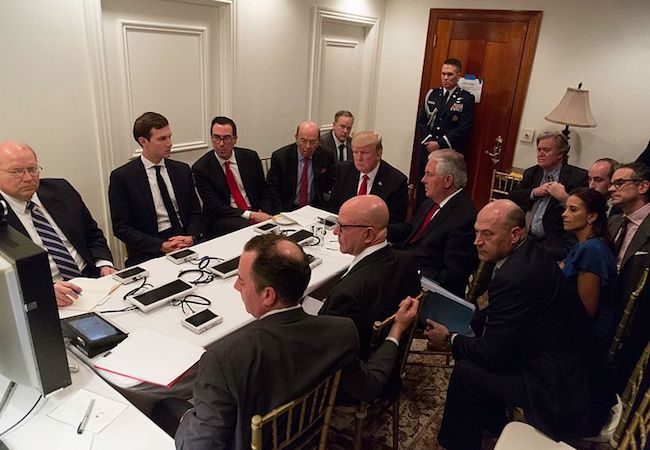Trump’s redemption at Putin’s expense?

By Ben Tanosborn
Donald Trump may have been told by his advisers that launching fifty-nine Tomahawk missiles, at a $15 million cost, against the small Shayrat air base in Syria was “necessary” and morally significant in retaliation for the recent chemical attack on Khan Sheikhun. A way to show Bashar al-Assad America’s outrage at the dictator’s presumed deeds… even if results from such action prove to be materially insignificant.
But, was it wise or even prudent to take such unilateral action without international and/or UN pre-arranged support? Was it really an admonition to Syria’s dictator “not to do it anymore,” as the chief honcho of the Senate, Mitch McConnell, seems to claim; or was it solely a perfect opportunity for a divided Republican Party to close ranks behind an erratic and arrogant president-by-default intent in enlisting blind support from the citizenry via his sophomoric truth-deflecting tweets?
Could this single action by the POTUS redeem him from two years of incredibly stupid oratory and a mounting litany of Munchausen lies, and bring him back to good graces with at least a slim majority of Americans? Could this action redeem Trump from any and all prior claims of Putinesque admiration and desire to make nice with Russia, and quickly absolve him of claimed Slavic fraternization, or any possible collusion affecting the recent presidential elections? Most important of all, could such military deed put Donald Trump in dress-uniform as Commander-in-Chief of the “Free World,” a chosen stalwart title self-awarded by Imperial America? Answers to these questions, whether from domestic polls or overseas voices, are likely to be heard soon… ad nauseam, as cable TV “breaking news.”
American public opinion, molded by a less-than-inquisitive mainstream media and two similarly-hawkish political parties, has selected Russia to be America’s enemy number one… with almost the entire population, through ignorance or political apathy, unable or unwilling to acknowledge the historic sub-rosa understanding which took place in 1991 as funereal rites ended the 44-year-old Cold War, thanks in great part to Mikhail Gorbachev’s wisdom through glasnost and perestroika… and not so much to Reagan’s peace efforts or his personal charm.
Not content with the humanity of peace, some Americans – unfortunately those holding the reins of power – prefer to hear the sound of victory bells, not those of compromise; and any patriotic (or influential) resurgence in old enemies, no matter how geopolitically restricted, is viewed as endangering US interests, a challenge to US’ global empire. To state it any other way would be at best deceiving, and at worst a lie.
Chances are that all investigations aimed at finding collusion between Trump’s rickety presidential campaign gang and a Russian government connection are likely to yield only circumstantial tidbits, but nothing that could be termed conspiratorial by a long shot. [We are not delving here into any state-sponsored cyber-spying or allied disinformation that both Russia and the US engage in to influence elections, or the success that either nation might have in that arena.] Unfortunately for hawkish politicians in the US, led by Senators McCain and Graham, former Secretary of State Clinton and a queue of long-standing adherents of global dominance, Russia will not become the scapegoat.
We would be remiss to question Vladimir Putin’s disdain for Hillary Clinton, or his preference for the election of Trump… it stands to reason that Clinton’s inflammatory rhetoric extending back six years left discordant notes in the Kremlin, while Donald Trump’s friendly attitude towards Putin and Russia augured the prospect of a reset in US-Russia relations with mutual benefits for both nations, including cooperation that could bring a semblance of permanent peace in the Middle East.
But Putin may have misjudged Trump’s helter-skelter brain, and how it gravitates to a single destination unaffected by constrains of idealism or loyalty, a temple-destination solely dedicated to the veneration of oneself: the Cathedral of Narcissism exhibiting the obligatory T at its main portico. And the opportunity that magnificently presented itself via the images of babies/toddlers in Khan Sheikun said to be victims of al-Assad’s chemical attack. Images that Donald Trump appropriated and used in his hypocritical flight from political trouble!
A new and improved Donald Trump is about to land at the White House: an anti-Russian Trump worthy of McCain and the Pentagon falconry; a Trump leaving behind (probably) embarrassing investigations; a Trump forging ahead as an astute politician… ready to join, and likely lead, America’s political mainstream; the mainstream he said to detest before his capture of the presidency.
Has Vladimir Putin, unwittingly, provided Donald Trump with a free ride to an unmerited redemption?




